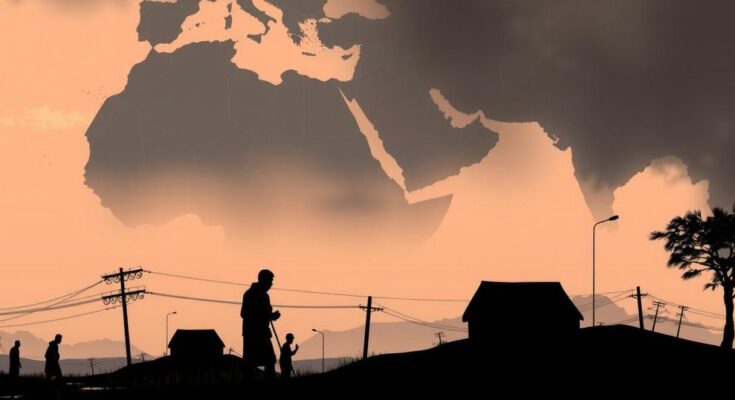The recent floods in Chad and Nigeria have impacted over 2.1 million people, causing over 1,000 deaths and displacing nearly 1 million individuals. The floods have ravaged homes and livelihoods, prompting urgent calls for humanitarian assistance. Key organizations are mobilizing to provide aid, yet the situation remains critical as the rainy season continues with no indication of improvement.
Recent catastrophic floods in Chad and Nigeria have adversely affected over 2.1 million individuals, resulting in more than 1,000 fatalities and the destruction of countless homes. The United Nations Office for the Coordination of Humanitarian Affairs (OCHA) has reported that nearly 4 million people are impacted by these floods, with approximately 1 million individuals compelled to flee their residences. Since July, severe flooding instigated by relentless rains has struck every province in Chad, leading to 341 deaths and displacing over 1.5 million people. In the wake of this disaster, numerous families have lost their homes and are now residing in schools and provisional shelters. Richard Ndoutabet Ngardoum, the National Director of SOS Children’s Villages Chad, has voiced grave concerns about the situation, stating, “Community families and their children are the worst affected, and the situation is very critical. On the ground, our teams see urgent needs for shelter, food, access to drinking water, hygiene supplies, and healthcare.” Richard also pointed out that the repercussions of these recurring floods are particularly devastating for marginalized communities. He elaborated, “The loss of over 60,000 livestock and the flooding of 250,000 hectares of farmland are having a direct negative impact on food security and the livelihoods of the population,” signifying a dire reliance on humanitarian assistance for survival. As the academic year approaches, the utilization of schools as temporary shelters for displaced families presents a significant challenge. “Temporary shelters will soon need to close, but the needs remain immense. The rainy season lasts until October, and the rain forecasts do not point to a decrease,” continued Richard Ndoutabet Ngardoum, emphasizing the urgent need for sustained support amidst rising waterborne disease risks, particularly cholera, due to contaminated waters. Chad’s neighbor, Nigeria, is also grappling with severe flooding. Eghosa Erhumwunse, National Director of SOS Children’s Villages Nigeria, reported that approximately 600,000 individuals have been impacted, with communities in Borno State suffering devastating losses. He remarked, “The devastating floods in Borno State have brought a tragic loss of life and destruction of property… We call on the international community to join us in this critical effort to restore hope and rebuild lives.” Despite the grim circumstances, there is some positive news regarding the calm in N’Djamena, Chad, and the establishment of some emergency provisions. Ongoing relief efforts aim to provide vital assistance to the communities most affected by these floods.
The flooding situation in Chad and Nigeria stems from unprecedented heavy rains that have wreaked havoc across West and Central Africa. The floods have not only caused significant loss of life but have also displaced millions and devastated local economies by destroying vital agricultural land and livestock. Humanitarian organizations have mobilized to address the critical needs arising from this calamity, facing challenges in access and logistics due to damaged infrastructure. The ongoing rainy season exacerbates the challenges faced by these regions, prompting an urgent call for international assistance to support affected populations, particularly vulnerable children and families.
In conclusion, the recent floods in Chad and Nigeria have led to a grave humanitarian crisis, affecting over 2.1 million individuals and causing extensive destruction. As communities struggle to cope with the immediate aftermath of these floods, there is a pressing need for sustained humanitarian assistance. Organizations such as SOS Children’s Villages are making concerted efforts to provide relief, but they require additional support from the international community to address the profound needs of those affected and to facilitate recovery and rebuilding efforts. Time is of the essence as the ongoing rainy season continues to pose further threats to already vulnerable populations, and swift action is crucial to mitigate the impact of this disaster.
Original Source: www.soschildrensvillages.ca




